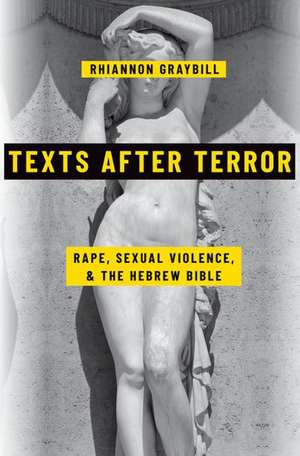Texts after Terror: Rape, Sexual Violence, and the Hebrew Bible
Autor Rhiannon Graybillen Limba Engleză Paperback – 19 dec 2023
| Toate formatele și edițiile | Preț | Express |
|---|---|---|
| Paperback (1) | 153.62 lei 10-16 zile | +48.26 lei 4-10 zile |
| Oxford University Press – 19 dec 2023 | 153.62 lei 10-16 zile | +48.26 lei 4-10 zile |
| Hardback (1) | 438.24 lei 10-16 zile | |
| Oxford University Press – 7 sep 2021 | 438.24 lei 10-16 zile |
Preț: 153.62 lei
Preț vechi: 187.94 lei
-18% Nou
Puncte Express: 230
Preț estimativ în valută:
29.40€ • 30.58$ • 24.27£
29.40€ • 30.58$ • 24.27£
Carte disponibilă
Livrare economică 14-20 martie
Livrare express 08-14 martie pentru 58.25 lei
Preluare comenzi: 021 569.72.76
Specificații
ISBN-13: 9780197764114
ISBN-10: 0197764118
Pagini: 248
Dimensiuni: 236 x 158 x 9 mm
Greutate: 0.36 kg
Editura: Oxford University Press
Colecția OUP USA
Locul publicării:New York, United States
ISBN-10: 0197764118
Pagini: 248
Dimensiuni: 236 x 158 x 9 mm
Greutate: 0.36 kg
Editura: Oxford University Press
Colecția OUP USA
Locul publicării:New York, United States
Recenzii
The volume moves beyond the usual feminist approaches to these stories and, as such, is bound to stimulate further discussion and reflection.
...this is a book pushes at the issues it raises in ways that linger, and that alone may commend it.
Her ultimate conclusion is compelling: feminist readings of texts should be seeking to find ways to contend with stories of sexual violence in the Bible rather than simply retelling difficult stories.
In Texts After Terror, Graybill models a way of reading biblical texts that honors and reveals their complexity, and provides the next generation of feminist scholars, and really all biblical readers, a way to continue to engage critically and authentically with many of the Bible's most disturbing narratives.
Texts after Terror is a daring and devastating tour de force — raising new questions, evoking new feelings, and proposing new relations for what else and what comes after multiple forms of sexual harm. With characteristic wit and anger, breadth and incision, brilliance and ambivalence, Rhiannon Graybill takes biblical interpretation beyond the depressingly low bar of consent toward other possibilities. Grappling with these texts and their violences requires staying with their manifest troubles and refusing their redemption or recuperation. In this and many other ways, Texts after Terror is as unsettling as it is indispensable.
Rhiannon Graybill shows herself a worthy inheritor of feminist biblical scholarship to build upon, poke holes in, push further, and complexify how rape tales have been read. Her "unhappy readings" of these tales take up feminist, queer, and strands of other theorization about sex, rape, rape culture, and power by reading through literature to situate the tales in the persistent misogyny that sadly still marks our own times.
Texts after Terror excels not only in its impactful contribution to ongoing development of scholarship in this area, but also in its stimulation of further critical dialogue around sexual violence in biblical texts.
...this is a book pushes at the issues it raises in ways that linger, and that alone may commend it.
Her ultimate conclusion is compelling: feminist readings of texts should be seeking to find ways to contend with stories of sexual violence in the Bible rather than simply retelling difficult stories.
In Texts After Terror, Graybill models a way of reading biblical texts that honors and reveals their complexity, and provides the next generation of feminist scholars, and really all biblical readers, a way to continue to engage critically and authentically with many of the Bible's most disturbing narratives.
Texts after Terror is a daring and devastating tour de force — raising new questions, evoking new feelings, and proposing new relations for what else and what comes after multiple forms of sexual harm. With characteristic wit and anger, breadth and incision, brilliance and ambivalence, Rhiannon Graybill takes biblical interpretation beyond the depressingly low bar of consent toward other possibilities. Grappling with these texts and their violences requires staying with their manifest troubles and refusing their redemption or recuperation. In this and many other ways, Texts after Terror is as unsettling as it is indispensable.
Rhiannon Graybill shows herself a worthy inheritor of feminist biblical scholarship to build upon, poke holes in, push further, and complexify how rape tales have been read. Her "unhappy readings" of these tales take up feminist, queer, and strands of other theorization about sex, rape, rape culture, and power by reading through literature to situate the tales in the persistent misogyny that sadly still marks our own times.
Texts after Terror excels not only in its impactful contribution to ongoing development of scholarship in this area, but also in its stimulation of further critical dialogue around sexual violence in biblical texts.
Notă biografică
Rhiannon Graybill is Marcus M. and Carole M. Weinstein and Gilbert M. and Fannie S. Rosenthal Chair of Jewish Studies and professor of Religious Studies at the University of Richmond. She is the author of Texts after Terror: Rape, Sexual Violence, and the Hebrew Bible (Oxford, 2021) and Are We Not Men?: Unstable Masculinity in the Hebrew Prophets (Oxford, 2016). She is the co-author (with John Kaltner and Steven L. McKenzie) of Jonah: A New Translation with Notes and Commentary (Yale Anchor Bible, 2023).
